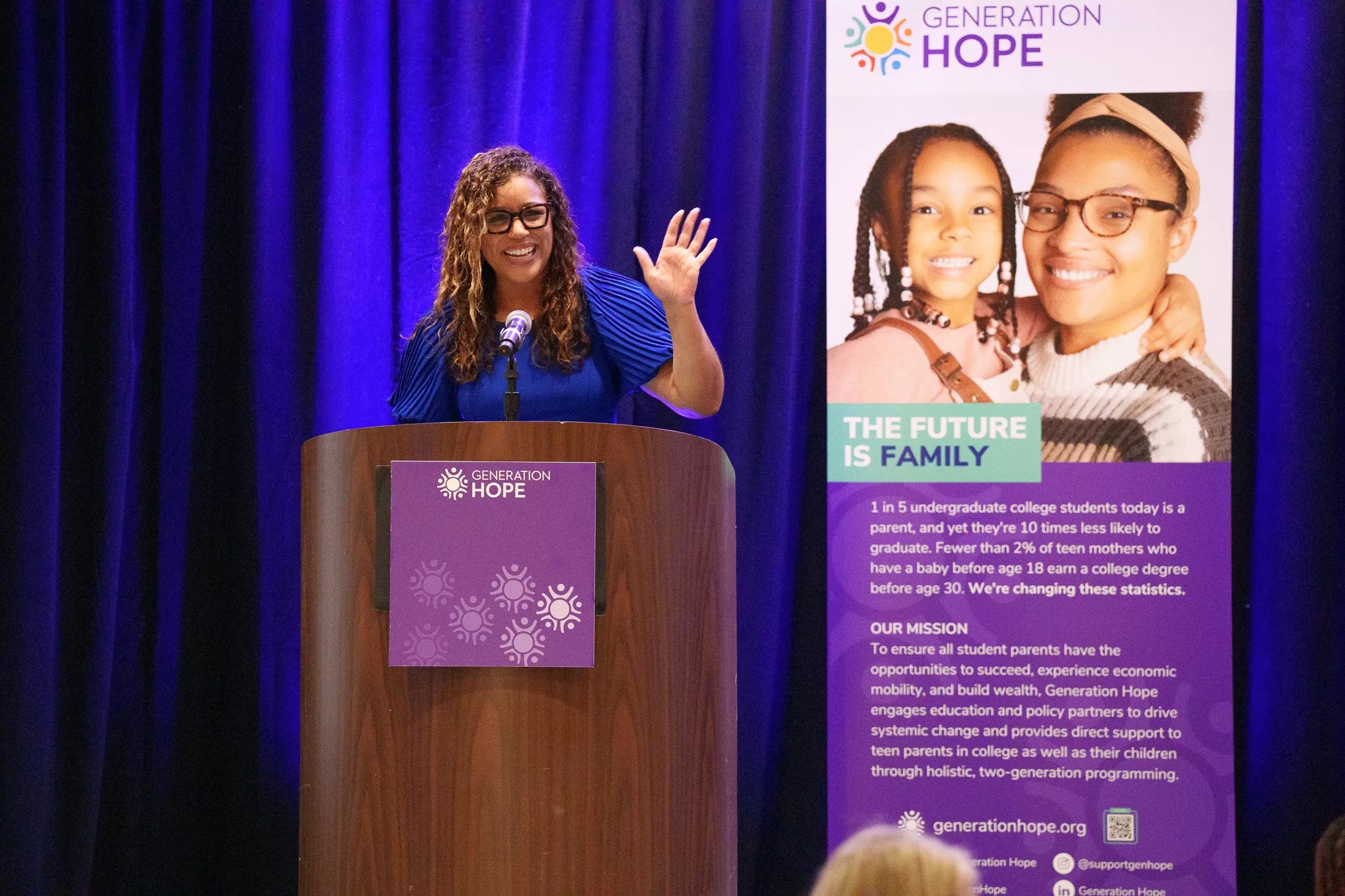
Courtesy Generation Hope

Audio By Carbonatix
During her senior year of high school, Nicole Lynn Lewis found herself facing a stack of college acceptance letters on one side of her desk, a positive pregnancy test on the other, and a mental note of scary statistics about what her future would be. She felt even more isolated after seeing how people in her community stigmatized people like her. Teen parents were often hidden and if they were seen, they were working at local fast-food restaurants with no future career prospects.
“There wasn’t anyone in my neighborhood, my school, my network, who I could look to, who had gotten pregnant young, and had gone off to college,” Lewis said. “Most of the girls in that situation disappeared.”
Not only would Lewis go on to walk across the stage with her daughter to receive her degree from the College of William & Mary and later a Master’s degree from George Mason University, but she would also go on to help other student parents across the country graduate from college through the nonprofit she’s the founder and CEO of, Generation Hope, born in 2010.
The organization provides a range of educational and financial support services to student parents. Perhaps most importantly, Generation Hope provides a community for an often marginalized population. This summer, the non-profit launched its Scholar Program in Dallas after seeing success in Washington, D.C., and New Orleans. Student parents in the program will receive a $1,200-2,400 scholarship, access to an emergency fund, career support, academic assistance, and mentorship to help guide them.
Will you step up to support Dallas Observer this year?
At the Dallas Observer, we’re small and scrappy — and we make the most of every dollar from our supporters. Right now, we’re $16,000 away from reaching our December 31 goal of $30,000. If you’ve ever learned something new, stayed informed, or felt more connected because of the Dallas Observer, now’s the time to give back.
“It’s not just about the scholars getting their scholarship and the wraparound services, but it’s also about, like, what that does for their kids,” Lindsey Cross, the director of the Scholar Program in New Orleans, said. “Those kids are going to be more likely to walk across the college graduation stage. They’re going to be more likely to have economic stability, build wealth, all of that.”
According to Healthy Futures of Texas, the Dallas County teen birth rate is higher than the rates both for the state and nationally. Lewis says that multiple factors play a part in that here. Increasing amounts of poverty, a lack of health insurance and inconsistent levels of sex education contribute to the high teen pregnancy rate in Dallas. Just as there are many reasons for high levels of teen pregnancy, the realities of young mothers are not all the same.
The student parents in the Scholar Program come from various backgrounds. One participant, Brooklynn Taylor, is an upcoming junior at Paul Quinn College in Dallas, studying Communications and Media Studies. In her immediate family, she would be the first to graduate from college. Her mother attended a nursing academy but dropped out when she learned she was pregnant with Brooklynn.
At first, she was hesitant about applying because she was worried about not getting accepted, but her high school mentor encouraged her to apply anyway.
“It was just a very, very low point, and I just knew to lean on my old school counselor,” Taylor said. “Because she was always in my corner when I was in high school, and she just so happened to know of the exact resources I needed to help me now.”
Taylor was going through a marriage separation while caring for her 7-month-old infant when she applied for Generation Hope’s program. Her life was anything but simple at the time, with her husband away in the Navy. Even after the separation, she lived briefly with one of her husband’s family members before she got her own apartment. From there, she felt compelled to complete her degree and hopefully start a career.
It wasn’t just the academic and financial help that relieved Taylor; it was also the community cultivated within the nonprofit. Taylor no longer felt lonely in her struggles.
“It honestly means not doing it alone, being a part of something bigger,” Taylor said. “And being surrounded by a lot of people, students and staff included, who see my potential, motivate me and believe in me and kind of like walk with me side by side every step of the way. [There is] someone I can lean on if I’m, you know, having a hard time.”
Licensed marriage and family therapist Ana Marcela Rodriguez provides bilingual counseling services, helping teen parents manage their mental health so that they can be their best selves for their children.
“We need to advocate for them because we know the bridges that we can place in their lives and how their futures can be brighter if we provide and give them access to all of these things, and one of these things is mental health care,” Rodriguez said.
The organization’s name says it all about what Generation Hope’s CEO sees when it comes to an oft-overlooked group she was once part of: hope.
“There are a lot of stereotypes about teen parents as a population,” Lewis said. “Makes it hard for people to connect higher ed with the teen parent population. When in reality, we know that these are incredibly capable young people. They are driven. They are motivated.”